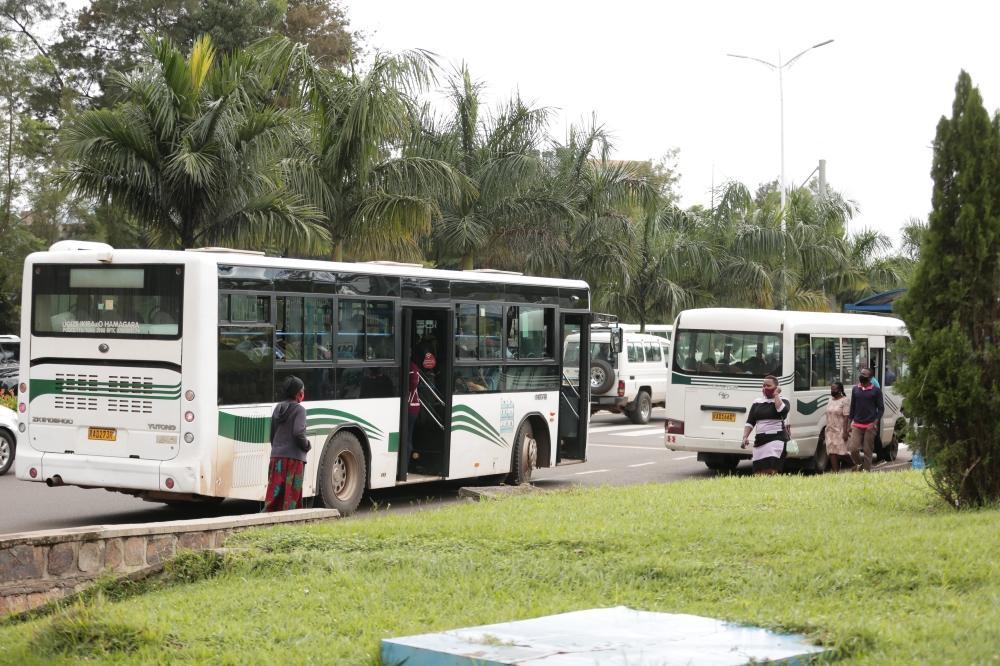Jean-Claude Ndaruhutse
Africa-Press – Rwanda. Imagine a public transport system where buses leave on time, whether they are full or not. In Kigali, that vision often feels like a distant dream, as private operators delay departures to maximize occupancy. This clash between operational efficiency and passenger needs has left many people wondering if the current model truly serves the public. The answer, a growing body of evidence suggests, lies in shifting ownership from private hands to the public realm.
At the 18th National Dialogue Council, in February 2023, the government promised to add over 300 new buses to Kigali’s roads. By November 2023, it was announced that 200 buses had already been purchased. At that time, 40 had arrived in Kigali, 60 were en route, and the remaining 100 were expected in January 2024. For many city residents, long frustrated by overcrowding and queues during peak hours, this was welcome news.
Yet months later, the core problem persists. Even with more buses, commuters still find themselves waiting over an hour in parked buses, particularly outside rush hours, because drivers wait for the buses to fill before departing. This practice, while understandable from a business perspective, undermines the reliability of the entire system and pushes many to use more expensive alternatives like motorcycle taxis or private vehicles.
The underlying cause, in my view, is structural. Kigali’s bus system is operated by private companies whose primary motivation is profit. In any market economy, private investors naturally focus on maximizing revenue. This approach works well in sectors like retail and manufacturing but can conflict with public interest when it comes to essential services like water, electricity, and public transport.
Public transport is fundamentally different from typical market-based services. Its value isn’t limited to revenue from fares; it also brings positive externalities that benefit society as a whole. Reliable public transport reduces congestion and air pollution, supports better land use and urban development, and ensures equitable access to economic opportunities. These broader benefits rarely align with private operators’ financial models, leading to gaps between commercial incentives and what cities actually need.
When buses only depart after reaching full occupancy, it may protect private profit but it leaves commuters paying the price in lost time, missed appointments, and reduced economic productivity. Worse still, these delays push those who can afford it toward private vehicles, increasing traffic congestion, pollution, and road safety risks.
Lessons from global cities and academic research
Kigali’s challenges mirror those experienced by many rapidly growing cities worldwide. Professor Vukan R. Vuchic, a renowned transport scholar at the University of Pennsylvania, documented – in his 2005 book – how American cities like New York, San Francisco, and Philadelphia faced similar problems. Private transit companies, constrained by fare caps designed to protect affordability, often cut service quality and maintenance to stay solvent. This triggered a vicious cycle of declining ridership and revenue, forcing deeper cuts that ultimately harmed both passengers and operators.
To break this cycle, many cities transitioned to public ownership. By 1970, publicly owned agencies made up just 15% of U.S. transit operators but carried 77% of passengers. By 1990, they constituted 31% of operators but handled an overwhelming 94% of transit trips.
European experience reinforces this lesson. British researchers Ian Taylor and Lynn Sloman reported in 2016 that French cities like Saumur and Thionville ended private contracts after they failed to deliver improvements. By bringing operations in-house, these cities saved up to 15% in operating costs, which they reinvested into expanding routes, increasing service frequency, and lowering fares.
In Reading, UK, the municipally owned Reading Buses reinvests around £3 million each year, about 12 to 15 percent of its annual revenue, to enhance service quality. This shows how publicly run systems can deliver better value and public benefit than purely profit driven private services. In Germany and Austria, public agencies play a major role in urban transit, further illustrating the global shift toward public management.
Benefits of public management
Vuchic, in his 2005 seminal book on urban transit, highlights several key advantages of public ownership over private operation—advantages that are particularly relevant for Kigali today.
One key benefit is integrated planning: a single public agency can coordinate all bus routes, timetables, and fare systems across the city. This creates a simpler and more affordable experience for passengers, who pay once for the entire journey rather than being charged separately for each transfer. For example, someone traveling across town can board one bus and then transfer to another without paying again, which makes public transport more attractive and accessible.
Moreover, consolidating numerous lines, vehicle fleets, and management structures under one unified agency can lead to considerable economies of scale. Centralized management helps eliminate redundant administrative overheads and allows operational resources to be used more efficiently, significantly improving overall cost-effectiveness and service delivery.
Another advantage of public ownership is that it prioritizes public service over profit. This means buses can run frequently even during off-peak hours, so passengers aren’t forced to wait until buses are full before departing. This approach directly improves reliability and convenience, encouraging more people to choose public transport over private vehicles.
A publicly owned transit system also enables strategic cross-subsidization to keep the entire network inclusive. Profits from busy, high-demand routes can be reinvested to maintain service on less profitable but socially essential lines. This ensures that all neighbourhoods, including underserved areas, continue to benefit from reliable and affordable transport.
Importantly, a publicly owned agency can better coordinate with government policies and manage subsidies effectively. This ensures public funds go toward improving service, expanding the network, and supporting the city’s broader development goals instead of increasing private profits. It allows the city to build a transport system that truly serves everyone and adapts to changing needs.
While some critics worry that public systems might become inefficient or lose competitive pressure, such risks can be managed through robust governance, transparency, and performance monitoring. Cities worldwide have demonstrated that publicly managed transport agencies can deliver reliable, affordable, and accountable services when well run.
Looking ahead: Modernizing Kigali’s transport
Beyond solving current delays, public ownership could provide the foundation for Kigali’s future mobility vision. The city could introduce Bus Rapid Transit (BRT), a network of buses running on dedicated lanes to avoid traffic jams, alongside smart transport technologies and in the longer-term plans to build a high-capacity train system to move large numbers of passengers efficiently.
Treating public transport like electricity or clean water means recognizing it as a basic urban right rather than a business purely driven by profit. Reliable, affordable, and inclusive public transport benefits everyone: commuters, businesses, and the city itself.
Kigali has the opportunity to learn from global experience and design a system that truly serves its people — not just the profits of private operators. With bold policy decisions and a clear vision, buses can be transformed from overcrowded, unreliable services, into an integrated, modern network that supports the city’s growth and the well-being of all its residents.
Source: The New Times
For More News And Analysis About Rwanda Follow Africa-Press






